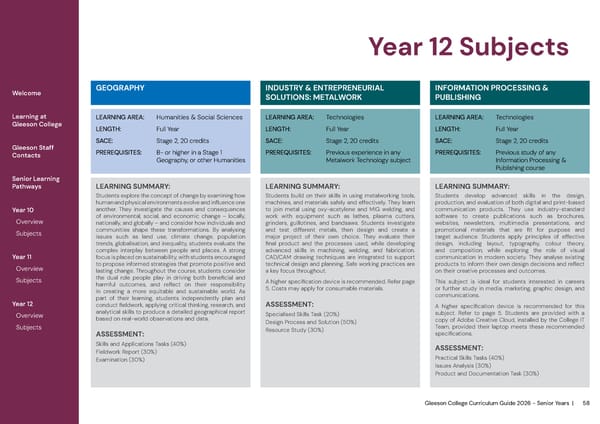Gleeson College Curriculum Guide 2026 - Senior Years | 58 Year 12 Subjects Welcome Learning at Gleeson College Gleeson Staff Contacts Senior Learning Pathways Year 10 Overview Subjects Year 11 Overview Subjects Year 12 Overview Subjects LEARNING SUMMARY: Students explore the concept of change by examining how human and physical environments evolve and influence one another. They investigate the causes and consequences of environmental, social, and economic change – locally, nationally, and globally – and consider how individuals and communities shape these transformations. By analysing issues such as land use, climate change, population trends, globalisation, and inequality, students evaluate the complex interplay between people and places. A strong focus is placed on sustainability, with students encouraged to propose informed strategies that promote positive and lasting change. Throughout the course, students consider the dual role people play in driving both beneficial and harmful outcomes, and reflect on their responsibility in creating a more equitable and sustainable world. As part of their learning, students independently plan and conduct fieldwork, applying critical thinking, research, and analytical skills to produce a detailed geographical report based on real-world observations and data. ASSESSMENT: Skills and Applications Tasks (40%) Fieldwork Report (30%) Examination (30%) GEOGRAPHY LEARNING AREA: Humanities & Social Sciences LENGTH: Full Year SACE: Stage 2, 20 credits PREREQUISITES: B- or higher in a Stage 1 Geography, or other Humanities INDUSTRY & ENTREPRENEURIAL SOLUTIONS: METALWORK LEARNING AREA: Technologies LENGTH: Full Year SACE: Stage 2, 20 credits PREREQUISITES: Previous experience in any Metalwork Technology subject LEARNING SUMMARY: Students build on their skills in using metalworking tools, machines, and materials safely and effectively. They learn to join metal using oxy-acetylene and MIG welding, and work with equipment such as lathes, plasma cutters, grinders, guillotines, and bandsaws. Students investigate and test different metals, then design and create a major project of their own choice. They evaluate their final product and the processes used, while developing advanced skills in machining, welding, and fabrication. CAD/CAM drawing techniques are integrated to support technical design and planning. Safe working practices are a key focus throughout. A higher specification device is recommended. Refer page 5. Costs may apply for consumable materials. ASSESSMENT: Specialised Skills Task (20%) Design Process and Solution (50%) Resource Study (30%) INFORMATION PROCESSING & PUBLISHING LEARNING AREA: Technologies LENGTH: Full Year SACE: Stage 2, 20 credits PREREQUISITES: Previous study of any Information Processing & Publishing course LEARNING SUMMARY: Students develop advanced skills in the design, production, and evaluation of both digital and print-based communication products. They use industry-standard software to create publications such as brochures, websites, newsletters, multimedia presentations, and promotional materials that are fit for purpose and target audience. Students apply principles of effective design, including layout, typography, colour theory, and composition, while exploring the role of visual communication in modern society. They analyse existing products to inform their own design decisions and reflect on their creative processes and outcomes. This subject is ideal for students interested in careers or further study in media, marketing, graphic design, and communications. A higher specification device is recommended for this subject. Refer to page 5. Students are provided with a copy of Adobe Creative Cloud, installed by the College IT Team, provided their laptop meets these recommended specifications. ASSESSMENT: Practical Skills Tasks (40%) Issues Analysis (30%) Product and Documentation Task (30%)
 2026 Gleeson College Senior Years Curriculum Guide 2026 Page 57 Page 59
2026 Gleeson College Senior Years Curriculum Guide 2026 Page 57 Page 59